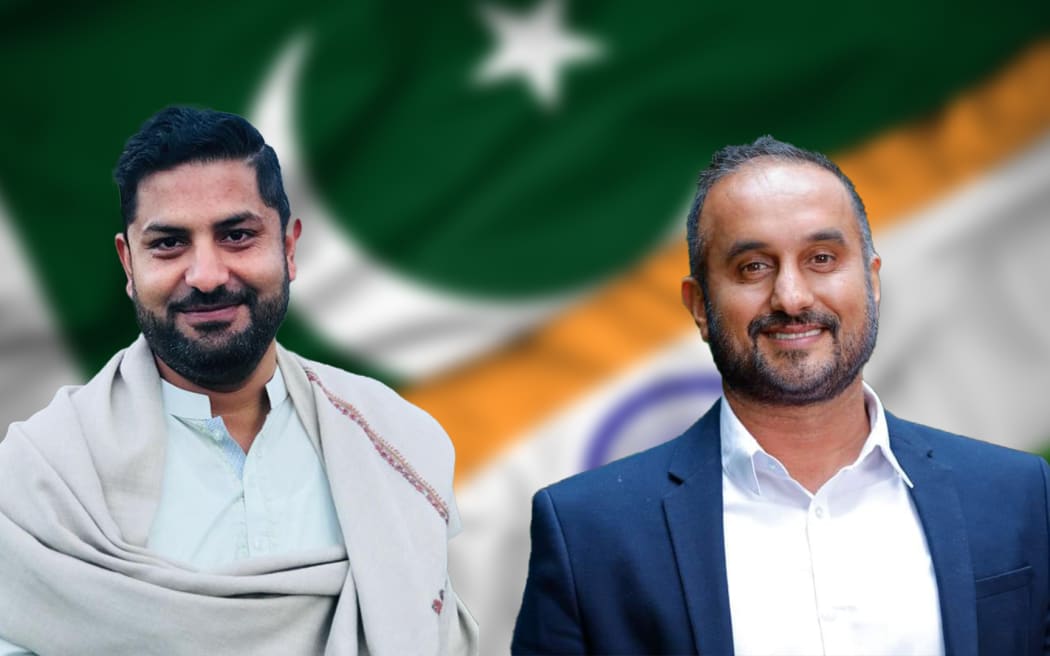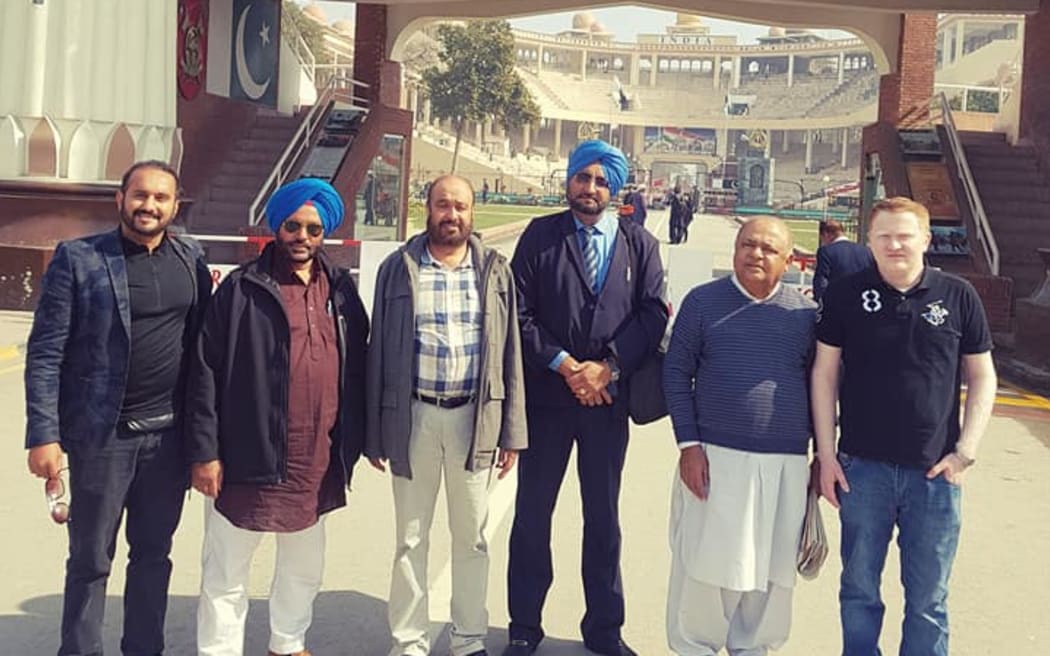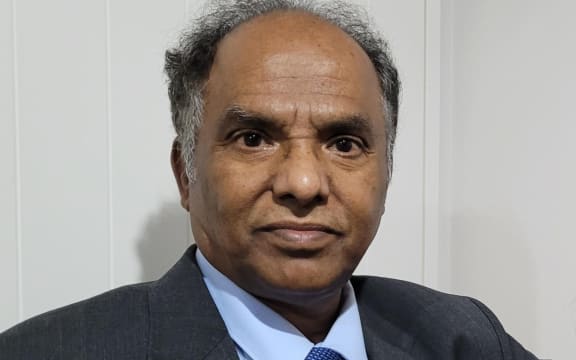
Asim Mukhtar and Navtej Randhawa met at a domestic radio station in 2017. Photo: Supplied
Navtej Randhawa and Asim Mukthar are both Punjabi, but they hail from opposite sides of a border.
Randhawa is a fourth-generation Kiwi Indian Sikh, while Mukhtar is a Kiwi Pakistani Muslim who relocated to New Zealand in 2014.
The pair first met at a domestic Punjabi radio station in 2017 and later developed a friendship.
This friendship inspired them to create a "fluid network of friends" who come together to celebrate their shared Punjabi heritage informally called Sanjha Punjab.
In 1947, when India gained freedom from British rule, the subcontinent was divided into two independent nations: Hindu-majority India and Muslim-majority Pakistan.
This partition triggered one of the largest migrations in human history, with millions of Muslims moving to West and East Pakistan (present-day Pakistan and Bangladesh) and millions of Hindus and Sikhs migrating in the opposite direction. This event became known as the "partition of India".
The partition stands as one of the darkest chapters in the history of India and Pakistan, resulting in the separation and displacement of numerous families, including the community in the Punjab region.
"Sikhs have been living in the Punjab region for thousands of years and suddenly in 1947 the British drew a line," Randhawa says. "Many people had to quickly leave their homes and find new places to live."
Despite the separation and the strained relations between India and Pakistan, Randhawa emphasizes that the Punjabi cultural roots remain strong, and the community desires to stay connected.
Randhawa has traveled to the Punjab region of Pakistan three times in the past, an experience that helped him recognize the striking similarities between both communities and laid the foundation for Sanjha Punjab in New Zealand.
"After visiting both the Punjabs in India and Pakistan, I felt the need for a better way to connect with each other here," he says.

Randhawa visited the Punjab region of Pakistan three times in the past. Photo: Supplied
Mukhtar is from Johady, a Pakistani village near the border with India.
"As a child, I used to imagine that if the river Ravi (which originates in the Lesser Himalayas in India) can flow into Pakistan, then certainly my own people who once lived here cannot be restricted," he recalls.
Mukhtar was intrigued by the idea of Sanjha Punjab.
Even though New Zealand has a larger population of Indian Punjabis compared to Pakistani Punjabis, both the communities identify with each other immensely because of their shared history and culture.
He believes that integrating the Pakistan and Indian Punjabi communities will benefit his own.
"Unfortunately, most Punjabis in Pakistan do not take pride in speaking the Punjabi language," Mukhtar says, adding that such perceptions might change once they have met Kiwi Indian Punjabis who recognise the importance of their native language.
Uniting the communities
Sanjha Punjab organises joint events for both communities.
"We hold poetry sessions, screen documentaries and host exhibitions to bring people from both communities together," Randhawa says.
He says these events play a crucial role in educating the next generation about their shared history and heritage.
Both Randhawa and Mukhtar agree that the Punjabi communities' relationship is evolving.
Randhawa says the community has longed for this development.
"They have embraced us and are now participating in family functions, a change we hadn't seen before," he says.
He says the community came together to watch India play Pakistan in the 2022 T20 Cricket World Cup.
It's not just cricket that unites the community.

Mujeeb Syed is the founder of the Urdu Hindi Culture Association of New Zealand. Photo: Mujeeb Syed
Mujeeb Syed, founder of Urdu Hindi Culture Association of New Zealand, says his association has been arranging ghazal nights and poetic symposiums to bring the communities together.
"Our association is dedicated to preserving and promoting the cultural heritage of Urdu, Hindi and Punjabi languages in New Zealand and providing information helpful to the community," Syed says.
Gurpreet Singh is the manager of Radio Sade Aala, a domestic radio station in Auckland.
Like Syed, he also uses both the communities love for music to cultivate friendship and harmony in the diaspora.
"We arrange a friendship event every year along with NZ Punjabi News during the Independence Day week for communities from both sides of the border," Singh says.
Singh says this year's event will be held on Saturday and will feature poets and singers from India and Pakistan.
A future without borders
"We hold the hope that one day we'll have a soft border, where Lahoris can visit Amritsar for an evening chai and Punjabis from the other side can do the same in Lahore," Mukhtar says.
Both communities aspire for leaders of both countries to find solutions.
In 2019, Pakistani Prime Minister Imran Khan inaugurated a visa-free programme that allowed Sikh pilgrims from India to visit one of their holiest shrines in Pakistan.
Thousands of Indian Sikhs have since made this historic pilgrimage to the shrine of Guru Nanak, the founder of Sikhism, located in Kartarpur, a small town just 4 kilometres across the Pakistan border, where he is believed to have passed away.
The Sikh faith is believed to have originated in Lahore, now part of Pakistan, in the 15th century when Nanak began teaching a faith that emphasized equality.
Following the religious violence ignited by independence and partition, which led to the deaths of around 1 million people, an estimated 20,000 Sikhs remain in Pakistan, with many having migrated to India.
"If Punjabis can peacefully coexist in South Auckland and forge friendships, this model could be extended to India and Pakistan," Mukhtar says.
Randhawa says Sanjha Punjab has the potential to become an organisation that will benefit the community in the future.
"It's very much a fluid network of friends now but, over time, I think it will have a registered organisational form," he says.

